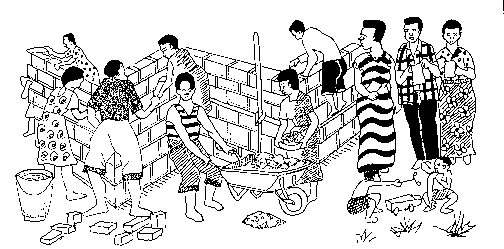Tweet
Translations:
Other Pages:
Modules
Site Map
Key Words
Contact
Utility Documents
Useful Links
Contents:
Contents:
Contents:
Contents:
Contents:
Contents:
CHAPTER SIX
Some Other Essential Elements
Training for Strength; A Community Management Training Methodology
by Phil Bartle, PhD
6. Some Other Essential Training Elements:
This chapter briefly looks at some of the other topics of workshops and informal training, other than the management training described in the above sections. These are only listed here, and explained in more detail in other CMP documents.
6.1. Gender and Disadvantaged Groups:
The participation of women, of disabled, of disenfranchised youth, of low income groups, and of other vulnerable groups, is an essential part of community management training.
In terms of human rights, these persons should not only be included, but targeted as primary recipients of benefits of each community project. Furthermore, the exclusion of such groups contributes to overall poverty and ineffectiveness.
It makes good practical sense to tap these resources that might otherwise be overlooked or missed because of extant traditions or outdated attitudes.
6.2. Ecologically Appropriate Development:
Community management training aims to be environmentally appropriate.
Recycling garbage, for example, if organized effectively, will tap an often overlooked resource of a community. Protection of renewable and non renewable resources also makes good economic sense for the community in the long run.
Raising awareness of ecological concerns during community management training, promotes this management principle.
Illustration 15: Technical Training; Learning to Recycle Waste:
 |
6.3. Monitoring:
Monitoring progress of any project or activity must be integrated with its planning and implementation. It is therefore included in community management training. Monitoring should be done by the community members themselves, by all other actors represented by the signatories of the community contract, and by or on behalf of the several donors.
For further information about measuring an increase in strength of communities, see Measuring Progress; Evaluating the Strengthening of Communities.
How to monitor, and how to institutionalize monitoring and assessment, are part of the community management training. Trainers as facilitators must draw out of community members (eg through brainstorming sessions) what should be monitored.
6.4. Transparent Financial Accountability:
If any one factor can contribute to early paralysis and cancelling of community activities, it is the suspicion of misuse of resources; thus endeth sustainability.
Community management training first raises awareness for the need of transparent accountability; ways in which all community members can see for themselves that the received resources are actually directed to the project and not diverted to other things. Then the training can go on to the "How" of transparent financial accountability, keeping accurate double entry ledgers, linking receipts to entries, producing accurate and valid financial statements and budget outcomes.
Decisions, such as sending copies of financial statements (when and to whom), and verbal reporting at community meetings, are made in brainstorming sessions as the facilitator trainer guides community members through the why and how.
6.5. Financial Recording and Reporting Curriculum:
As an integral part of our strengthening of community based organizations, we assist participating CBOs to develop skills in recording and reporting financial transactions. There are two parts to this strategy. One is that we require participating CBOs to sign contracts that include proper recording and reporting of financial transactions. The other is that we offer training in simple accounting and reporting procedures.
The content of the training should be designed so that it can be understood very readily by persons who do not have a high level of education. Basic numeracy (ie something like literate, but an ability in using numbers) might be assumed, but not a high level of literacy. The content should be designed, with simple hand outs, to be used down our mobilization pyramid, so that the coordinators understand it, that the assistants can be guided by the coordinators, that the mobilizers can be guided by the assistants and the executive members of each CBO can be guided by those mobilizers, assistants and coordinators.
The initial training for each CBO should include training aids, basic supplies needed to record financial transactions, eg ledger book, pens, receipt books, and paper.
The emphasis on the training should be on accountability and transparency. Our aim is not to provide esoteric skills to individuals, but to use the training as a means of promoting community empowerment, as an element of community management training, and to ensure that community project accounts are kept accurately, and understood (and therefore able to be monitored) by all members of participating communities.
The training should not emphasize a "lecture approach," where participants a told what to do. The style should not only be a "facilitation style" of a leader drawing information out of the participants, but should be "hands on," where participants are required to fill in ledgers, prepare financial statements and instruments of accountability, and to accompany written reports with verbal reports, as if to community meetings.
The training should be supportive and encouraging. No criticism or contradiction of participants by facilitators or trainers should be permitted. When participants make errors, the trainers should simply demonstrate the correct or appropriate procedures to be followed or the skills to be applied. The trainers and facilitators should honestly praise every achievement, and frequently emphasize that the participants have the ability to keep accurate accounts, prepare adequate reports, and maintain transparency, especially towards community members.
6.6. Financial Skills Training Workshops:
First, there should be an in-house national workshop, to which coordinators, assistants, and at least one head mobilizer from each parish attend. While none of these persons should actually keep community accounts, they must be completely familiar with the accounting skills and procedures required, and become trainers of the CBOs who must be responsible for their own community project accounts.
Those who attend this first workshop should use their skills (learned in the in-house workshop) for training, encouraging and monitoring the CBOs who keep their own community project accounts. Then there should be several district workshops for community project implementors. The participants of these workshops should include at least three to five CBO executive committee members. These should include the committee treasurer, and at least one of the Chair, Vice-Chair or Secretary of the CBO executive. We advise that at least one other member of the community, not on the executive, should attend. By this time the assistants and mobilizers should act as facilitators to assist the coordinator and main trainer at each district workshop. Any other mobilizers who did not attend the first workshop, should attend.
Executive members of the CBO should be the focus, and such a workshop should include those from several different community based projects. (This ensures the valuable results of sharing different but related experiences).
Follow-up meetings with the CBO executives, to go through the ledger books and other records, should be made by the coordinators. To provide feedback to CBOs for financial reports is the responsibility of coordinators. Such feedback should include written comments on some reports and verbal comments on all reports submitted. Feedback should be supportive, encouraging and informative. While avoiding criticism, feedback should point out as many good points as possible, and make suggestions for improvement where necessary. Assistants and mobilizers should be encouraged to provide feedback in a manner similar to that of the coordinators.
The content of the financial training is included in Appendix 3, and reproduced in the document: Financial Training for CBOs.
Illustration 16: Community Monitoring and Assessment:
 |
6.7. Reporting:
Not only should financial transactions be recorded accurately and made transparent to all concerned, so should all activities and events that relate to reaching the objectives of the community activity or project. Again, the why and how is dealt with by facilitator trainers in brainstorming sessions.
The preparing of written reports is part of the substantive management skill training. The reproduction and distribution of narrative reports must be included in proposals and contracts. See Report Writing.
6.8. Personnel Management Skills:
The larger the community project or activity, the more complex. Many different people will be doing many different things (actions) to contribute to reaching the project objectives. The management of people requires specific skills.
Especially the executive committee of the CBO, but also many of its members, can contribute to better management of the project (and later other community activities after the project is completed) if they know some of the skills of good management. The accurate use of praise and encouragement, the avoidance of complaining and criticism, for example, are not just good manners; they are good personnel management tools. They are part of the training.
6.9. Organizing Volunteers:
As mentioned above, good management skills are needed to complete any community project. Voluntary (donated) labour is a special case. Handling voluntary and donated labour, including communal labour donated by unskilled work groups, attending executive meetings for planning, free donations of some skilled labour, calls for a skilled sensitivity above even that of directing paid labour.
Remember that the reward to paid labour is mainly the fee or salary (and work satisfaction), while the reward to donated labour is a good feeling of accomplishment and being appreciated. The organizers of a community project must see that their praise and genuine expression of appreciation, in public, is needed in order to obtain and sustain donated labour.
6.10. Funds Raising:
As well as the mobilization and management of donated resources, labour, land, tools, transport and planning meetings, the organizers of a community project must also know or learn how to raise money. Here a facilitator should be familiar with many methods of raising money.
By using a brainstorming session the facilitator does not make speeches or lecture to the CBO on how to raise money, but asks for ideas and suggestions from the trainees. By outlining categories of obtaining funds, the facilitator can draw out of the CBO specific strategies while at the same time stimulate them with new and interesting perspectives on obtaining financial resources.
Nowadays there are conferences on third world NGO funding, and even a local NGO in India that does nothing but raise funds for other NGOs. The possibilities are surprisingly numerous and interesting.
One of several documents about obtaining resources is: Fund Raising for CBOs.
6.11. Training Records:
A "paper trail" should be left behind all training activities; the first of which should be the written proposals for training workshops. Each workshop should be preceded with a training workshop proposal.
The proposal should not consist merely of a budget, but include purpose, specific objectives, identity of participants, reasons for the choice of participants, content of the training, style (small groups, activities), schedule, expected results of the training, background of the facilitators, resource personnel and/or trainers, and what kinds of training aids (overheads, videos, films, cut-outs, dancing and drumming) will be used.
See Preparing a Workshop. After each workshop, the coordinator (with input from the other facilitators, including a written report from the main trainer) should write a report.
The report should not be just a list of activities that took place. Each report should be analytical, and focus on the results of the activities that took place, and how far they reached the objectives of the workshop.
6.12. Sustaining Community Interest:
The easiest way for a community to lose interest in a community project, is for action to be suspended for too long a time. (Slogan: "Even if you are on the right track, if you are not moving fast enough you will get run over."). Project organizers can be trained in methods of sustaining action and interest by a trainer facilitator who uses brain storming sessions to draw plans out of the project organizers, whenever action becomes stalled.
The organizers can sustain community interest by planning their project so as to ensure that there is not only progress, but there is seen (by community members) to be progress. The facilitator trainer can remind the trainees of this when assisting them in deciding how to plan their community project, and again whenever things become too slow.
––»«––
Illustration 17: Reporting to the Community:
 |
Note: To copy or download each image from its URL, right-click on it and choose the "Save_Picture_As" option in the pull-down menu. Also see Community Strengthening Cycle Illustrations , Disaster Illustratons, Income Generation Illustrations and Extra Illustrations for complete sets with no text. You can down load the illustrations from there for producing your own training material.
- Introduction:
Training For Strength - Chapter One:
Introducing Management Training for Communities - Chapter Two:
Training for Community Action - Chapter Three:
Management Training to Empower Communities - Chapter Four:
Training in Community Management Programme - Chapter Five:
Some Players in the Strengthening Methodology - Chapter Six:
Some Other Essential Training Topics